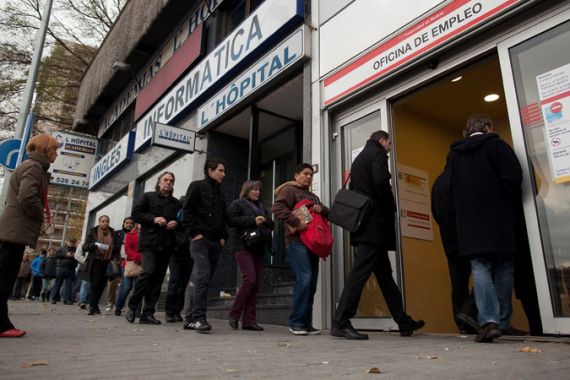Eurozone unemployment rises to record levels
Jobless rate rises to 11.9 percent in 17 countries sharing euro, up from 11.8 percent in December, data show.

Unemployment in the eurozone rose to an all-time high in January, with an estimated 19 million people in the bloc out of work, the EU’s statistics office said.
January’s unemployment rate rose to 11.9 percent in the 17 countries sharing the euro, up from 11.8 percent in December, with another 201,000 people out of work, Eurostat said on Friday.
Keep reading
list of 4 itemsA flash flood and a quiet sale highlight India’s Sikkim’s hydro problems
Why is Germany maintaining economic ties with China?
Behind India’s Manipur conflict: A tale of drugs, armed groups and politics
The data shows that “an end to the labour market downturn is not yet in sight,” said Martin van Vliet, an economist at ING Bank.
“Even if the eurozone economy exits from recession in due course, the labour market is likely to remain in recession for most if not all of this year.”
But overall joblessness masks a large divide, with only five percent unemployment in Austria compared with 27 percent in Greece, although Eurostat’s data from Athens was from November, the latest available.
“The economic division between the southern periphery and the core will not change in 2013,” said Commerzbank economist Christoph Weil.
“While the economy in the core countries … should grow again in the first quarter, it will probably still contract in most periphery countries through to the second half of the year,” he said.
On the eurozone inflation front, Eurostat said the rate of price increases fell to 1.8 percent in February, putting it well below the European Central Bank’s target rate for the first time in more than two years.
In January, the inflation rate was 2.0 percent. The last time inflation was below this level was in November 2010 when it hit 1.9 percent.
The ECB, whose first responsibility is price stability, has a long-term inflation target of close to but below 2.0 percent.
Low inflation would normally be seen as a positive, meaning price pressures are contained, but it also reflects the state of consumer demand which inevitably suffers at times of high unemployment when people worry about job security and prefer to save their money rather than spend it.
The eurozone slipped into its second recession since 2008 last year and economists see the downturn continuing during 2013.